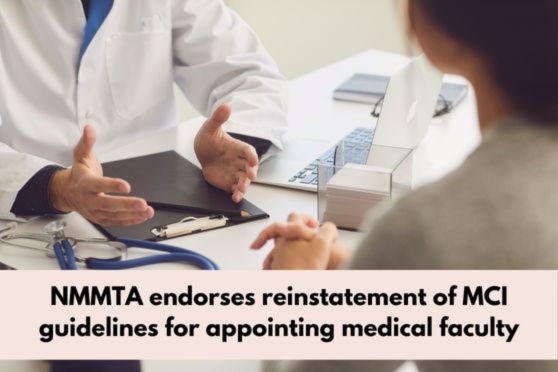National M.Sc Medical Teachers' Association (NMMTA) Advocates Competency-Based Medical Education


Data from the Medical Council of India reveals a significant shortage of MBBS graduates pursuing post-graduation in non-clinical specialities, necessitating the exploration of alternative qualified workforce options. Despite an increase in MD seats in non-clinical specialities over the years, 40-50% of these seats remain unfilled annually due to most MBBS graduates opting against pursuing post-graduation in these subjects.
Even with attractive incentives such as free seats and other perks, interest remains low, leading to a considerable gap in non-clinical faculty positions. In light of these findings, the National M.Sc Medical Teachers' Association (NMMTA), an organisation committed to advancing excellence in medical education, endorsed the government's decision to reinstate MCI's guidelines on appointing medical M.Sc/Ph.D. teachers in non-clinical specialities.
The NMMTA supports the government's researched and contemplated decision, which aligns with the global best practices in medical education. Several members of the NMMTA are distinguished academicians and researchers, actively contributing to international institutions, underscoring the worldwide recognition and value of this approach.
As per the latest survey conducted by the NMMTA, the medical M.Sc course, running parallel to MD programs, has demonstrated a huge increase in the number of graduates. The program includes a comprehensive three-year curriculum, providing students with training similar to MD students, resulting in a 20% increase in the number of qualified medical M.Sc/Ph.D. teachers in non-clinical specialities over the past three years.
Employing qualified candidates like medical M.Sc/Ph.D. applicants helps bridge faculty shortages, particularly in remote and rural areas where medical colleges often face shortages of qualified faculty.
Over the past three years, medical students have benefited from the expertise of medical M.Sc/Ph.D. teachers, leading to a marked improvement in student satisfaction and academic performance.
Mr Tukaram Prabhu, President of NMMTA, said, "Our medical M.Sc/Ph.D. qualified teachers have a pivotal role in imparting knowledge and skills to our medical students in non-clinical specialities. The NMMTA advocates for the coexistence of both categories of teachers.”
"Medical M.Sc / PhD qualified teachers are equipped to educate students in non-clinical subjects. Together, let us strive for excellence and provide the best learning experience for our medical students," added Dr Ayan Das, General Secretary of NMMTA.
The Competency-Based Medical Education (CBME) guidelines, which include early clinical exposure in the first year and integrated teaching of up to 20% of the curriculum, have been successfully implemented by the world's leading countries, predominantly with the assistance of MSc/PhD teachers and a few Clinical teachers.
However, the limited number of faculties in pre- and para-clinical specialities in our country is an issue which needs to be brought to light. The existing student-teacher ratio makes it challenging to implement small-group teaching, thereby compromising the essence of the CBME curriculum. An increase in faculty numbers will help facilitate enhanced small-group teaching.
Pertaining to the challenges faced by the Medical PhD faculties in Indian Medical schools, this has resulted in limited participation of India in medical research. Hence, NMMTA requests the Ministry to investigate these facts in addition to the policy of addressing faculty shortages.
Furthermore, it is suggested that the Government must substantially increase Clinical PG seats, convert non-clinical PG seats to Clinical seats, and encourage doctors devoted to basic sciences to pursue Medical MSc & PhD.
The National M.Sc Medical Teachers' Association (NMMTA) is a ten-year-old professional organisation dedicated to promoting excellence in medical education. The association aims to foster collaboration and uphold quality in medical education, particularly in non-clinical specialities. For more information, visit: medicalmsc.org